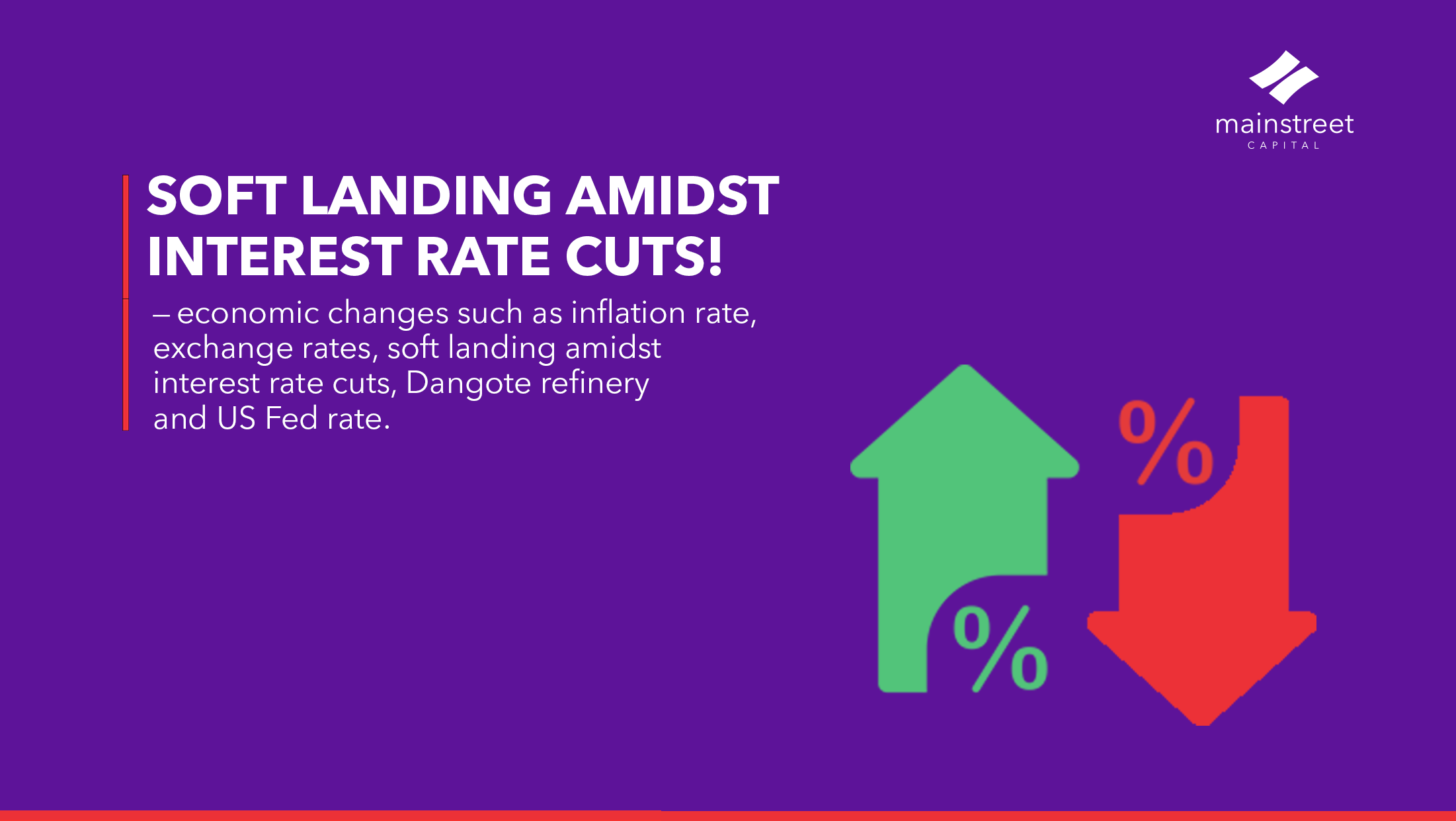
In this article, we explore economic changes, including inflation rates, interest rates, and Gross Domestic Product (GDP). We will also examine developments at Dangote refinery, the US Federal Reserve’s interest rate decisions, the prospect of a soft landing amidst rate cuts.
US Federal Reserve Cuts Interest Rate After Four Years
At the last FOMC meeting, the US Federal Reserve lowered the federal funds rate by 50 basis points to a range of 4.75%-5.00%. This marks the first reduction since 2020, aimed at revitalizing the economy after a lengthy battle with inflation. Data shows the US added 142,000 jobs in August, maintaining steady employment growth.
Meanwhile, inflation eased to 2.5%, down from July’s 2.9%, inching closer to the Fed’s target of 2.0%. Lower interest rates can reduce borrowing costs for consumers, making loans for homes, cars, and other expenses more affordable. This encourages spending, which is crucial for economic growth.
In Asia, China’s central bank also cut rates, highlighting a global trend toward stimulating economic activity amidst concerns over weak growth.
Nigeria’s Monetary Policy Committee Hikes Interest Rate
In contrast, Nigeria’s Monetary Policy Committee raised the benchmark rate to 27.25%, an increase aimed at combating inflation, which eased to 32.15% in August from 33.40% in July. While higher interest rates typically increase borrowing costs and dampen consumer spending, they can also stabilize the currency and lower inflation over time. Investors in fixed-income assets may see better returns, though existing bond values may decline as rates rise.
Energy Markets and Oil Prices
The Organization of the Petroleum Exporting Countries (OPEC) has stated that it does not have a specific price target for crude oil, amid speculation of Saudi Arabia allowing lower prices to regain market share. Recent reports show a decline in crude oil inventories, yet oil prices fell as initial optimism over Chinese economic stimulus faded. China announced an economic stimulus aimed at reviving its economy including over $325 billion in monetary interventions.
Nigeria’s Refinery Developments
The Dangote Refinery began petrol distribution mid-September, partnering with the Nigerian National Petroleum Corporation Limited (NNPC). Although expectations for reduced fuel prices were high, the price list, ranging between ₦900 to ₦1,300 per litre is disappointing. While the government aims for naira-based transactions to alleviate foreign exchange pressures, the commodity pricing will still be influenced by dollar benchmarks.
A backstory
According to the Minister of Finance, Nigeria spends an average of $600million on fuel importation per month ($7.2billion per year) due to limitations in domestic refining capabilities. Despite the availability of the Kaduna Refinery with a refining capacity of 110,000 barrels per day, the Warri Refinery with a capacity of 125,000 barrels per day, the Port Harcourt Refinery with a capacity of 210,000 barrels per day, output still fails to meet the demand for petroleum products.
S&P Global projects that the Dangote Petroleum Refinery can help alleviate Nigeria’s forex issue, easing the pressure on the local naira currency while also improving the country’s economic development. Well, we will keep watch in months to come if this plays out.
Global Economic Snapshot
Eurozone: The European Central Bank cut its deposit rate to 3.50%, while inflation eased to 2.2%. Economic growth remains sluggish, expected at only 0.8% for the year.
United Kingdom: Bank of England maintained a 5% interest rate, but cuts are anticipated in the coming months, with economic growth projections for 2024 at 1.2%.
Equities Market Highlights
The equities market sentiments in Nigeria reflect economic changes including inflation and policies by the Central Bank of Nigeria.
The equities market started September on a positive note and ended on a positive note. Investors made profits from rallies during trading sessions, as the NGX ASI recorded only seven negative sessions. The market sessions were propped up by buys in banking stocks (amid the capital raise exercise) and some Oil & Gas stocks.
As Half Year 2024 earnings results are being released, data from the market indicated that some banks core business activities sustained profitability, including Access Holdings, Guaranty Trust Holdings, Stanbic IBTC, and Zenith Bank Plc.
Overall, September’s market performance was bullish as investors closely monitored changes in policies and economic decisions.
Looking ahead, we may see some volatility in the equities market in the last quarter of the year. Investors will be looking closely for signs of how the economy is responding to rising interest rates and inflation.
Although, inflation expected to ease further though current petrol hikes and transport costs could paint a different picture. The MPC has, however, hinted that it may continue to raise rate till the decline in month-on-month inflation is very significant.
Reader’s Corner
As Warren Buffett once said, “At all times, in all markets, in all parts of the world, the tiniest change in rates changes the value of every financial asset.” While cutting interest rates could lead the US Fed toward a soft landing, it’s essential to remain cautious as this outcome is not guaranteed. For a better economic position, other economic indicators such as inflation, unemployment, gross domestic product, consumer spending, among others, are to be taken into consideration.
As we approach year-end, we look forward to recognizing the “Most Resilient Economy” and “Best Inflation Taming Act.” Fingers crossed for Nigeria!
To Stay tuned for more updates; follow Mainstreet Capital on social media ( LinkedIn | X | Instagram | Facebook ) and fill this form to subscribe to our newsletter. Remember, the more you learn, the better equipped you’ll be to make sound investment decisions.
Until next time, happy Investing!